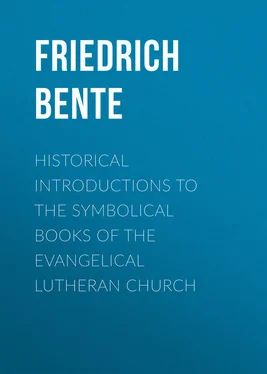Friedrich Bente - Historical Introductions to the Symbolical Books of the Evangelical Lutheran Church
Здесь есть возможность читать онлайн «Friedrich Bente - Historical Introductions to the Symbolical Books of the Evangelical Lutheran Church» — ознакомительный отрывок электронной книги совершенно бесплатно, а после прочтения отрывка купить полную версию. В некоторых случаях можно слушать аудио, скачать через торрент в формате fb2 и присутствует краткое содержание. ISBN: , Жанр: foreign_antique, foreign_prose, на английском языке. Описание произведения, (предисловие) а так же отзывы посетителей доступны на портале библиотеки ЛибКат.
- Название:Historical Introductions to the Symbolical Books of the Evangelical Lutheran Church
- Автор:
- Жанр:
- Год:неизвестен
- ISBN:http://www.gutenberg.org/ebooks/26909
- Рейтинг книги:3 / 5. Голосов: 1
-
Избранное:Добавить в избранное
- Отзывы:
-
Ваша оценка:
- 60
- 1
- 2
- 3
- 4
- 5
Historical Introductions to the Symbolical Books of the Evangelical Lutheran Church: краткое содержание, описание и аннотация
Предлагаем к чтению аннотацию, описание, краткое содержание или предисловие (зависит от того, что написал сам автор книги «Historical Introductions to the Symbolical Books of the Evangelical Lutheran Church»). Если вы не нашли необходимую информацию о книге — напишите в комментариях, мы постараемся отыскать её.
Historical Introductions to the Symbolical Books of the Evangelical Lutheran Church — читать онлайн ознакомительный отрывок
Ниже представлен текст книги, разбитый по страницам. Система сохранения места последней прочитанной страницы, позволяет с удобством читать онлайн бесплатно книгу «Historical Introductions to the Symbolical Books of the Evangelical Lutheran Church», без необходимости каждый раз заново искать на чём Вы остановились. Поставьте закладку, и сможете в любой момент перейти на страницу, на которой закончили чтение.
Интервал:
Закладка:
Luther continues: "This is the way the devil goes to work. He attacks Christ with three storm-columns. One will not suffer Him to be God; the other will not suffer Him to be man, the third denies that He has merited salvation for us. Each of the three endeavors to destroy Christ. For what does it avail that you confess Him to be God if you do not also believe that He is man? For then you have not the entire and the true Christ, but a phantom of the devil. What does it avail you to confess that He is true man if you do not also believe that He is true God? What does it avail you to confess that He is God and man if you do not also believe that whatever He became and whatever He did was done for you?" "Surely, all three parts must be believed, namely, that He is God, also, that He is man, and that He became such a man for us, that is, as the first symbol says: conceived by the Holy Ghost born of the Virgin Mary, suffered, was crucified, died, and rose again, etc. If one small part is lacking, then all parts are lacking. For faith shall and must be complete in every particular. While it may indeed be weak and subject to afflictions, yet it must be entire and not false. Weakness [of faith] does not work the harm but false faith – that is eternal death." (St. L. 10, 998; E. 23, 258.)
Concerning the mystery involved in the doctrine of the Holy Trinity, the chief topic of the Ecumenical Creeds, Luther remarks in the same tract: "Now, to be sure, we Christians are not so utterly devoid of all reason and sense as the Jews consider us, who take us to be nothing but crazy geese and ducks, unable to perceive or notice what folly it is to believe that God is man, and that in one Godhead there are three distinct persons. No, praise God, we perceive indeed that this doctrine cannot and will not be received by reason. Nor are we in need of any sublime Jewish reasoning to demonstrate this to us. We believe it knowingly and willingly. We confess and also experience that, where the Holy Spirit does not, surpassing reason, shine into the heart, it is impossible to grasp, or to believe, and abide by, such article; moreover, there must remain in it [the heart] a Jewish, proud, and supercilious reason deriding and ridiculing such article, and thus setting up itself as judge and master of the Divine Being whom it has never seen nor is able to see and hence does not know what it is passing judgment on, nor whereof it thinks or speaks. For God dwells in a 'light which no man can approach unto,' 1 Tim. 6, 16. He must come to us, yet hidden in the lantern, and as it is written, John 1, 18: 'No man hath seen God at any time; the only-begotten Son, which is in the bosom of the Father, He hath declared Him,' and as Moses said before this, Ex. 33: 'There shall no man see Me [God] and live.'" (St. L. 10, 1007; E. 23, 568.)
III. The Augsburg Confession
18. Diet Proclaimed by Emperor
January 21, 1530, Emperor Charles V proclaimed a diet to convene at Augsburg on the 8th of April. The manifesto proceeded from Bologna, where, three days later, the Emperor was crowned by Pope Clement VII. The proclamation, after referring to the Turkish invasion and the action to be taken with reference to this great peril, continues as follows: "The diet is to consider furthermore what might and ought to be done and resolved upon regarding the division and separation in the holy faith and the Christian religion; and that this may proceed the better and more salubriously, [the Emperor urged] to allay divisions, to cease hostility, to surrender past errors to our Savior, and to display diligence in hearing, understanding, and considering with love and kindness the opinions and views of everybody, in order to reduce them to one single Christian truth and agreement, to put aside whatever has not been properly explained or done by either party, so that we all may adopt and hold one single and true religion; and may all live in one communion, church, and unity, even as we all live and do battle under one Christ."
In his invitation to attend the diet, the Emperor at the same time urged the Elector of Saxony by all means to appear early enough (the Elector reached Augsburg on May 2 while the Emperor did not arrive before June 16), "lest the others who arrived in time be compelled to wait with disgust, heavy expenses and detrimental delay such as had frequently occurred in the past." The Emperor added the warning: In case the Elector should not appear, the diet would proceed as if he had been present and assented to its resolutions. (Foerstemann, Urkundenbuch, 1, 7 f.)
March 11 the proclamation reached Elector John at Torgau. On the 14th Chancellor Brueck advised the Elector to have "the opinion on which our party has hitherto stood and to which they have adhered," in the controverted points, "properly drawn up in writing, with a thorough confirmation thereof from the divine Scriptures." On the same day the Elector commissioned Luther, Jonas, Bugenhagen, and Melanchthon to prepare a document treating especially of "those articles on account of which said division, both in faith and in other outward church customs and ceremonies, continues." (43.) At Wittenberg the theologians at once set to work, and the result was presented at Torgau March 27 by Melanchthon. On April 4 the Elector and his theologians set out from Torgau, arriving at Coburg on the 15th, where they rested for eight days. On the 23d of April the Elector left for Augsburg, while Luther, who was still under the ban of both the Pope and the Emperor, remained at the fortress Ebernburg. Nevertheless he continued in close touch with the confessors, as appears from his numerous letters written to Augsburg, seventy all told about twenty of which were addressed to Melanchthon.
19. Apology Original Plan of Lutherans
The documents which the Wittenberg theologians delivered at Torgau treated the following subjects: Human Doctrines and Ordinances, Marriage of Priests, Both Kinds, Mass, Confession, Power of Bishops, Ordination, Monastic Vows, Invocation of the Saints, German Singing, Faith and Works, Office of the Keys (Papacy), Ban, Marriage, and Private Mass. Accordingly, the original intention of the Lutherans was not to enter upon, and present for discussion at Augsburg, such doctrines as were not in controversy (Of God, etc.), but merely to treat of the abuses and immediately related doctrines, especially of Faith and Good Works. (66 ff.) They evidently regarded it as their chief object and duty to justify before the Emperor and the estates both Luther and his protectors, the electors of Saxony. This is borne out also by the original Introduction to the contemplated Apology, concerning which we read in the prefatory remarks to the so-called Torgau Articles mentioned above: "To this end [of justifying the Elector's peaceable frame of mind] it will be advantageous to begin [the projected Apology] with a lengthy rhetorical introduction." (68; C. R. , 26, 171.) This introduction, later on replaced by another, was composed by Melanchthon at Coburg and polished by him during the first days at Augsburg. May 4 he remarks in a letter to Luther: "I have shaped the Exordium of our Apology somewhat more rhetorical ( hretorikoteron ) than I had written it at Coburg." ( C. R. , 2, 40; Luther, St. L. 16, 652.) In this introduction Melanchthon explains: Next to God the Elector builds his hope on the Emperor, who had always striven for peace, and was even now prepared to adjust the religious controversy in mildness. As to the Elector and his brother Frederick, they had ever been attached to the Christian religion, had proved faithful to the Emperor, and had constantly cultivated peace. Their present position was due to the fact that commandments of men had been preached instead of faith in Christ. Not Luther, but Luther's opponents, had begun the strife. It was for conscience' sake that the Elector had not proceeded against Luther. Besides, such action would only have made matters worse, since Luther had resisted the Sacramentarians and the Anabaptists. Equally unfounded were also the accusations that the Evangelicals had abolished all order as well as all ceremonies, and had undermined the authority of the bishops. If only the bishops would tolerate the Gospel and do away with the gross abuses, they would suffer no loss of power, honor, and prestige. In concluding Melanchthon emphatically protests: "Never has a reformation been undertaken so utterly without any violence as this [in Saxony]; for it is a public fact that our men have prevailed with such as were already in arms to make peace." (Kolde, l. c. , 13.) The document, accordingly, as originally planned for presentation at Augsburg, was to be a defense of Luther and his Elector. In keeping herewith it was in the beginning consistently designated "Apology."
Читать дальшеИнтервал:
Закладка:
Похожие книги на «Historical Introductions to the Symbolical Books of the Evangelical Lutheran Church»
Представляем Вашему вниманию похожие книги на «Historical Introductions to the Symbolical Books of the Evangelical Lutheran Church» списком для выбора. Мы отобрали схожую по названию и смыслу литературу в надежде предоставить читателям больше вариантов отыскать новые, интересные, ещё непрочитанные произведения.
Обсуждение, отзывы о книге «Historical Introductions to the Symbolical Books of the Evangelical Lutheran Church» и просто собственные мнения читателей. Оставьте ваши комментарии, напишите, что Вы думаете о произведении, его смысле или главных героях. Укажите что конкретно понравилось, а что нет, и почему Вы так считаете.












